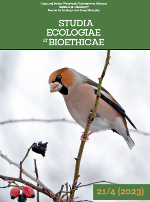Paper Bags vis-à-vis LDPE Bags: Gleanings from Peer-reviewed E-LCA Publications
Paper Bags vis-à-vis LDPE Bags: Gleanings from Peer-reviewed E-LCA Publications
Author(s): Isabell Lidbrand, G Venkatesh, Magnus LesteliusSubject(s): Energy and Environmental Studies, Environmental and Energy policy
Published by: Wydawnictwo Naukowe Uniwersytetu Kardynała Stefana Wyszyńskiego w Warszawie
Keywords: circular economy;E-LCA;global warming potential;LDPE;paper bags;plastic bags;water usage
Summary/Abstract: Fossil-plastics or paper? Or for that matter, bio-plastics and paper? This is a well-entrenched question in academic research, industrial, social and policy-making circles. As environmental life-cycle analyses (or more appropriately, sustainability analyses) show time and again, no single product or process or mode of operation is a ‘total villain’. There are goods and bads, and at times, more of the one than the other. This paper, which is based on a course-report written by the first author at Karlstad University (Sweden), restricts itself to a review of publications which have opted to compare paper bags with low density polyethylene (LDPE) plastic bags, on the basis of their environmental impacts. Environmental impact categories include the global warming potential, energy demand, fossil fuel depletion, water usage, acidification, eutrophication, and a range of toxicities – human, terrestrial, freshwater-aquatic and marine-aquatic. The articles were obtained through Google Scholar, read and reviewed to glean the results presented therein. The ‘What’, ‘How’ and ‘Where’, so to say were studied carefully to understand the reasons behind any differences or similarities detected. On the basis of this focused review, even though no new knowledge is being added, the common belief that the paper bag is environmentally superior to the LDPE alternative is further consolidated. However, if one focuses on water usage and would assign a high weightage to that environmental impact, LDPE perhaps may score a few ‘brownie points’ over paper. One must also not forget that plastics (LDPE in this instance) can be recycled without significant deterioration in its functional properties. In a circular economy (the bioeconomy part of which gradually will expand over time), while introducing more and more bio-based products into the technosphere by way of trans-materialization is recommended, plastics will still continue to exist – albeit in much smaller amounts – and it would be perfectly fine if the degree of recycling is augmented significantly. Speaking of a holistic sustainability analysis, the socio-economic aspects of a choice between LDPE and paper bags must also be factored in, and studied. Much-desired change happens when the top-down meets the bottom-up somewhere midway.
Journal: Studia Ecologiae et Bioethicae
- Issue Year: 21/2023
- Issue No: 4
- Page Range: 63-76
- Page Count: 14
- Language: English

